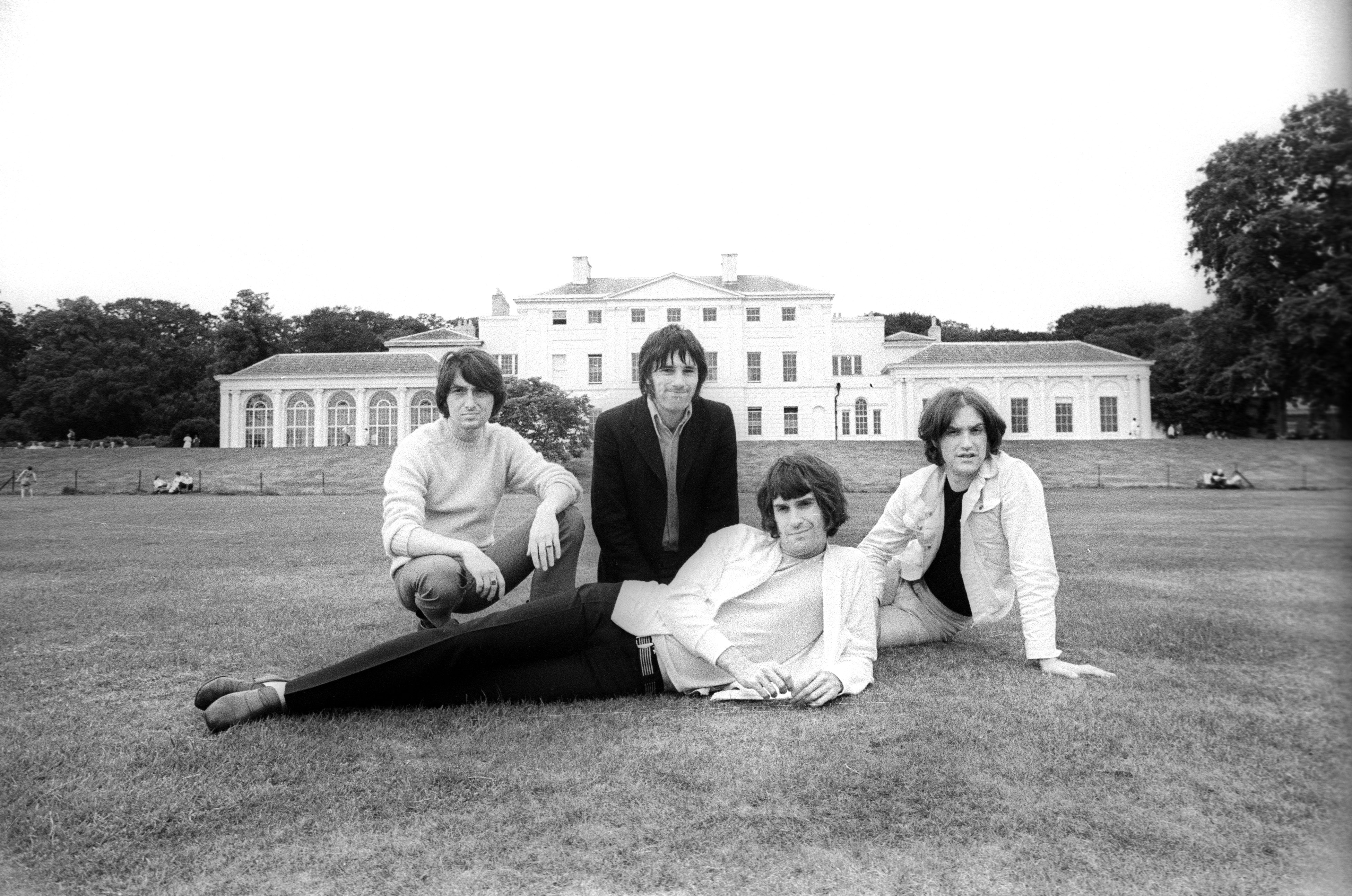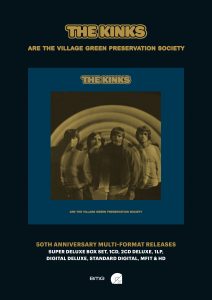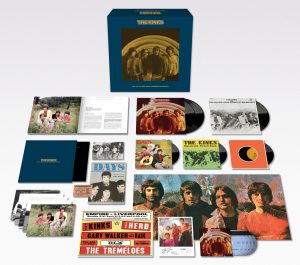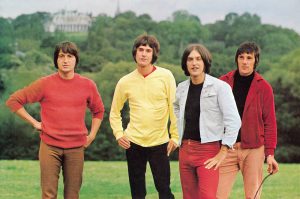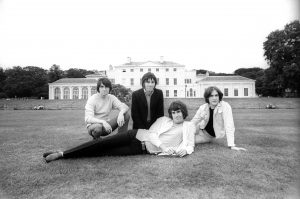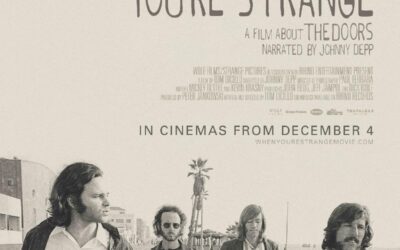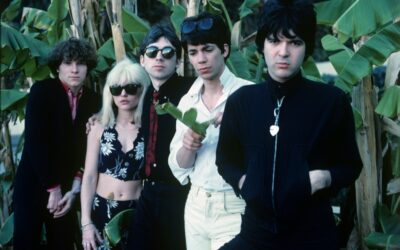50th Anniversary Multi-Format Releases: Super Deluxe Box Set, 1CD, 2CD Deluxe, LP, Digital, MFiT & HD
By Harvey Kubernik c 2018
The Kinks have just released a 50th anniversary special edition of one of the greatest rock albums of all time The Kinks Are The Village
Green Preservation Society on BMG.
This essential album by one of the world’s best ever bands is defined by the extraordinary catalogue of Ray Davies’ songs, driven by brother Dave Davies’ power pop guitar and became the foundation of generations of British guitar pop. The Kinks Are The Village Green Preservation Society cemented Ray Davies reputation as one of Britain’s finest songwriters of his and any generation.
“I think The Village Green Preservation Society is about the ending of a time personally for me in my life,” says Ray.
“In my imaginary village. It’s the end of our innocence, our youth. Some people are quite old but in the Village Green, you’re never allowed to grow up. I feel the project itself as part of a life cycle.”
Somewhat overlooked upon its release in November 1968, The Kinks Are The Village Green Preservation Society is now regarded as one of the best albums ever recorded.
Created in difficult circumstances by a band on the verge of disintegration and who refused to follow fashion, it is an album of timeless, perfectly crafted songs about growing up and growing old, and the decline of national culture and traditional ways. Enduring and unsurpassed, with its wit, sadness, quiet anger, regret and charm, it is generally considered the high point of The Kinks’ outstanding career and Ray Davies’ masterpiece.
Included in this anniversary edition are many previously unreleased tracks and versions, including the previously unreleased track ‘Time Song.’ Despite never been included on a release, ‘Time Song’ was performed by The Kinks at the Theatre Royal, Drury Lane in January 1973, celebrating Britain’s entry into the Common Market.
“When we played a concert at Drury Lane in ’73 to ‘celebrate’ us about to join what was called The Common Market, I decided to use the song as a warning that time was running out for the old British Empire,” offered Ray.
“This song was recorded a few weeks later but never made the final cut on the Preservation Act I album. Oddly enough, the song seems quite poignant and appropriate to release at this time in British history, and like Europe itself the track is a rough mix which still has to be finessed.”
Ray mixed the track earlier this year and it is included on the new VGPS deluxe box set and deluxe 2CD.
The deluxe box set includes extensive sleeve notes, interviews, photography and specially created online and press content “telling the story” of the album’s production, release and cultural impact. Also included are two essays on the album written by Pete Townshend and renowned journalist Kate Mossman.
For additional information on VGPS and the multi-format retail configurations please visit https://www.bmg.com/us/news/the-kinks-50th-anniversary.html
Shel Talmy is the American record producer who worked with The Kinks from 1963-1967. Besides producing The Kinks’ albums in this marvellous period, Talmy also produced The Who, Chad & Jeremy, Cat Stevens and Pentangle.
Talmy was not involved in production capacity for The Village Green Preservation, Ray Davies had assumed the producer role.
Numerous sessions for VGPS were done at Pye Studios with additional recordings at other studios including Riverside, Polydor, Aeolian Hall and the Playhouse Theatre.
During 2018 I asked Talmy, a Fairfax High School graduate, to describe the Pye studio where he and the Kinks collaborated on a slew of classic LP’s.
“Pye #2 studio in the basement of ATV House, was the band studio and am guessing the dimensions about 20X 30 to 40. Pye #1 was the orchestral studio and a lot bigger, never worked in it.
“Entering the studio, the control room was on the left, again guessing dimensions 10 X 15. We had Ampex tape machines, 3-track and mono, and a little later, 2-track. They had a good selection of mikes, Neumann, Telefunken, Shure, AKG etc, and I made use of a lot of them as I was miking drums with a dozen mikes.
“There was also a good B3 organ with Leslies that John Lord played for the first LP, and a good piano, I think a baby grand that Nicky Hopkins played on.
“The drum corner was near the control room and I had guitar and bass amps against the walls with baffles around them. This studio had really good acoustics and one of the reasons it was in constant use.”
“Village Green is an album that never ceases to surprise me. The sound, the songs—everything about it is perfect,” touted filmmaker Morgan Neville, Oscar-winner for the 2013 documentary 20 Feet From Stardom. “I’ve been listening to it my entire life (as a second generation Kinks fanatic), and I’m passing it along to my kids.”
“The end of 1968 was a strange year for me with respect to contemporary pop music at the time,” stressed writer and author Tosh Berman. “There was a movement that started from the British invasion to something more heavier sounding. Jimi Hendrix Experience brought a larger canvas that was forceful and highly sexual.
“Also, there was a change in the air where bands got a more heavy sounding, or focus on a trio sound. I think of Cream, with their live material, Led Zeppelin as well as groups like Blue Cheer. It was about volume, power, and very masculine figures fronting these bands. Most teenagers of my age were drawn to this new physical heavy sound. So within 12 months, the world and history of the charming Kinks seemed to disappear from the U.S. planet. It was by accident that I picked up on The Kinks latest album in 1968, The Kinks Are The Village Green Preservation Society.
“Their very title was totally the opposite of such titles like Axis Bold as Love, Wheels of Fire, Crown of Creation, Anthem of the Sun, and so forth. Also, I was intrigued that the Kinks album wasn’t called We Are The Village Green…’
“Ray Davies seemed to be making a statement that it’s The Kinks Are the Village Green…’
“1968 was very much part of the collective mentality, and Ray and company seemed to be going on the opposite direction of that year. So, my first reaction of holding this album in a record store somewhere in the San Fernando Valley was that this was a band that has no importance in the year 1968. Perversely enough, I didn’t like a lot of music being produced in ’68, so I bought this new Kinks album.
“I didn’t expect anything because although a great band; it was a group from another era -1967 or 1966! When I played the entire side one and two of the album, my life changed. Not only was this album my favorite recording from The Kinks ever, but also and apparently the most exceptional record ever made. Records have walloped me throughout my youth, but as a 15-year old teenager, starting to feel the oddness of sexual feelings, it militantly spoke to me.
“On one level it is an extreme statement of purpose, in that there is an excellent value in one’s history – especially in Ray’s life, and I feel like I was reading Ray’s journal or his thoughts as I listened to this album. Every song on Village Green struck me as a personal observation or statement of some sort. It took me a few years later to realize another textural aspect of the album that maybe it’s not personal, but Ray Davies is either doing observational writing on his surroundings or perhaps a made-up world. In other words a work of fiction, but set in a song-cycle that is Village Green.
“What became evident to me is that Ray is very much of a writer such as the late 19th-century novelist William Makepeace Thackeray or Charles Dickens who wrote about their society in such a manner that was large in scope and presentation. Ray was writing about his world in a distant yet critical way in where he’s exposing certain aspects of society at work and play. As I matured and started to read more, so did my discovery of The Kinks’ work. Ray Davies is not a figure who is going to hang out with The Beatles or The Stones, but a dedicated writer who observed from the sidelines, and listens to what people say about their lives.
“The Kinks Are The Village Green Preservation Society is a masterpiece work of music journalism, that depending on mood, seems to be a very personal work for the listener, but in fact, it’s a world being exposed and thought about. Truly one of the great albums of all time.”
“It wasn’t only, most obviously, Dylan and those Beach Boys who were defiantly toning things and turning amps down in the wake of Sgt. Pepper’s onslaught,” notes long-time Kinkdom resident and writer Gary Pig Gold.
“With little left to fear, nor much reputation remaining to live up to after several Big American Top Forty flops in a row, Raymond Douglas Davies and his band of rockin’ underdogs journeyed far, far past even Big Pink on their 1968 trip homeward …all the way, in fact, back to that splendidly manicured, Lavender-dappled Village Green of yore. And upon arrival Ray, Pete, Mick and even Dave settled straight down there for thirty-eight pastural minutes of soft-focus sonics coloured by Mellotron sparrows and phenomenal housepets; where the only fuzz to be found was not via the younger Davies’ guitar, but on the grizzled mug of Walter.
“Yes, and while this otherwise picture-book LP does indeed contain its unfair share of braggarts and downright baddies – really, what Kink record worth its salt doesn’t?! – much more quality time is spent instead seeing friends laying by their riverside, safe beneath the widest biggest sky this side of Kelvin Hall. Why, you can almost picture Sir Ray, notepad and box Brownie camera in hand, strolling bemused through the final frames of Antonioni’s Blow Up as he conjured what is perhaps the most understated of all the true blue masterpieces within his band’s canon.
“Now VGPS may in fact be turning 50 …so many of our longest-playing friends are these days. But when all is said and sung – when the strobe-lit smokebombs have cleared all the late-Sixties hoopla and bombast from sillier quarters, this Village Green truly doesn’t sound a second over the late 18th Century. Just as our heroes surely intended it to.”
“In early 1964 a seismic shift took hold of both our culture and our counter-culture,” explains record collector and music enthusiast, Scott Atkin.
“Gone was be-bop, doo-wop, skiffle, and crooning. The British invasion asserted its dominance during these ‘pre-FM’ days. Touring and being played on one of the two or three AM radio stations was literally a group’s survival. Most cities didn’t even offer more than one station to play ‘rock and roll.’ We now had The Beatles, The Rolling Stones, The Who, The Yardbirds, The Hollies, Herman’s Hermits, The Dave Clark Five and Donovan. Needless to say, the competition was fierce!
“By November 1968 the British explosion was still a mushroom cloud when one of these bands, inexplicably banned from performing in the U.S. for the previous 4 years (with one more year to go) released an album that practically disappeared into thin air. Uncharted and unnoticed; was it because it was released on the same day as The Beatles White Album? Was it because songs about nostalgia, old friends, steam powered trains, and sitting by riversides just weren’t as fun as songs about sunshine supermen, purple hazes, street fighting men, and pinball wizards?
“One wonders how what Rolling Stone magazine now considers the 255th greatest album of all time could have been such a titanic flop. As a fan I knew and stood by this work from the beginning and now the world too is finally recognizing The Kinks Are the Village Green Preservation Society for what it is and always has been. A masterpiece! Now 50 years later, the world has a chance to rectify this grievous error. We all have a chance to buy this album again for the first time on its 50th anniversary! You see now how life works. God saved The Kinks!”
The Kinks Are the Village Green Preservation Society — VGPS — is the last album by the original Kinks lineup and Ray Davies’ first completely successful translation of his late-Romantic British sensibility into the language of rock,” instructs Dr. James Cushing, English and Literature Professor at Cal Poly San Luis Obispo.
“The album’s weirdly complicated 1968 release history (two versions, one 15 cuts, the other 12, with a different order, four cuts not shared) and the excessiveness of the 2018 deluxe reissue (6 CDs, two vinyl LPs, three 7” 45rpm vinyl singles and a book in a box for $130.00) tend to obscure its real accomplishment, which is clear and direct.
“The lyric theme uniting the 15 highly crafted, single-length tracks is a man’s discovery of the power of memory to preserve key moments of feeling against the press of time. It’s the same theme Davies explored in ‘Waterloo Sunset,’ the same theme that obsessed Wordsworth a century before. The result in one case was the ‘Immortality Ode,’ and in the other, a coherent concept album exploring the personal meaning of pre-WW2 British cultural traditions.
“But VGPS also offered, by implication, a quiet criticism of the psychedelic ‘revolution’ in its style and sound. ‘You take the sunshine, I’ll take the shadows,’ Davies sings in ‘Monica.’
“One of the things that lyric means is, you take the acid, sitars and cut-up tapes. I’ll take a pint, two guitars, bass, drums, and vocals.
“It’s useful to contrast Davies’ critical distance from late-60s culture with that of two American skeptical observers, Zappa and Dylan. Zappa attacked hippie excess head-on in We’re Only In It For the Money, and Dylan treated it like a cow-pie to be stepped around on Nashville Skyline. But Davies’ ‘God save china cups and virginity’ comes off as less abrasive than ‘Flower Punk’ and less anodyne than ‘Peggy Day’ because the character Davies creates is always aware of his vulnerability to loss. ‘I’m not frightened of this world, believe me,’ he pleads on ‘Days,’ and we hear only his plea, not his confidence.
“Speaking of vulnerability in a Dylan-related context, VGPS shares more with Music from Big Pink than their surfaces would lead you to expect. Although Big Pink is not a concept album, both The Band and The Kinks ignore flash and virtuosity and head straight toward the great story of human life in time. In different accents, Ray Davies and Robbie Robertson — in 1968, of all years! — persuade us that tradition is in no way exhausted, and that not all structures are prisons.
“Back in the U.K., the Beatles shared Davies’ fondness for British music-hall traditions, but the nostalgic coherence of Sgt. Pepper is only on the surface. VGPS is a deeper concept album than Pepper, less adventurous in sound but more coherently expressive of a single personal vision. Davies creates a layered, fragile-yet-funny character here, distributing his emotional experience throughout the songs without obvious cross-referencing. In this way, VGPS anticipates Davies’s later character-driven theatre pieces like Arthur or Percy.
“History would arrange for the Beatles’ White Album and VGPS to be released the same day in November 1968. The Beatles’ self-annihilating embrace of the universal pure white light won that year’s Zeitgeist Gold Medal, and the Kinks’ shadowy reflection on their greeny island was pretty much ignored. That won’t happen in 2018, will it?”
“At one time, I owned the most beat up, trashed copy of The Kinks Are
The Village Green Preservation Society anywhere,” admitted Miriam Linna who co-hosts with Marc Miller Waterloo Underground on luxuriamusic.com every Friday night 3-5 pm Pacific/6-8 Eastern. The world’s first and only 2-hour weekly radio show dedicated to reuniting the Kinks.
“The record had been a bone of contention between myself and my then-future husband Billy, whose allegiance to Something Else was set in stone by the first time I recall meeting him, on October 3, 1977.
“He loved to tell about how I had ignored him at a Ramones show, or how I hadn’t looked up from reading when we supposedly met at the midnight movies, at least a year
earlier. But I still don’t remember anything about him before 10/3/77, when we started seeing an awful lot of each other. The game in those early days at my 9th Street walk-up was playing records against each other. It was always a contest — who had the better record, or the better argument about it.
“There was a lot of ‘Oh, come ON’ stuff happening, and after a while, I let him win these silly arguments, although I knew I was clearly right and if I had wanted, I could have won every debate, fair and square. That said, it still took six months before I could sit by and watch him sling my records out the window. I could see that he was making a point, but record slinging was difficult for me to bear. Billy was a hard-core Kinks fan, he having seen the band many more times that I, precisely because the Kinks first show on my teenage turf (Cleveland) was in 1974. He had been seeing them in New York five years ahead of me. Still, there was no debate about either of us being Kinks fans.
“The friction was between favorite albums by them, a total dilemma because each was packed with killer songs. Billy was devoted to Something Else and refused to back down. For me, it was my beat up Village Green, which had suffered from thrift shop rotation before landing on the floors of various teenage rooms in Ohio and finally, New York City. So it was inevitable that one winter day, the contest came to be between the two LP’s, and of course I would have to cave, for the sake of letting the dear boy win. But I knew where it was at. The Great Debate went on way into that Saturday night, and on Sunday morning, I could not believe my eyes when I heard Billy beckoning YOO-HOO! MISSY! as he yanked up the frozen living room window, making a big production of holding the record face up, commanding me to say GOOD-BYE and then, with much drama– out the window it went, six flights down into the snowy, slushy street, as it ran through my mind in twisted milliseconds. I was mortified.
“I recall there was a scream as I jumped out of bed and grabbed some semblance of hat and gloves to tear down the stairs to retrieve my preciousness before it was run over by a garbage truck. When I got downstairs, I couldn’t see the record anywhere, and I went, sobbing up and down the street, and checking the snowy fire escapes to see if it had landed on one or the other side of the street. Then I heard YOO-HOO, MISSY! From up above and I saw Billy’s head was sticking out the sixth floor window. I was crying and snow blind and with slush up to my bare knees and one slipper lost in a snow bank. As I tried to shield my eyes, he holds out the Village Green album—‘LOOK WHAT I FOUND!’ He had faked the throw.
“A year later, when we got a place together, we combined collections and got rid of the worse condition doubles, sticking the second class citizens in a fruit crate for an eventual record swap.
“Nowadays, it’s Billy’s VG+ copy that forever haunts the kollection. Of course he loved the Village Green album as much as I did, but the joy of taunting me to tears was just too tempting.
“So there are 14 reasons to adore this fine comp of super sides: ‘The Village Green Preservation Society,’ ‘Do You Remember Walter?’, ‘Picture Book,’ ‘Johnny Thunder,’ ‘Last of the Steam-Powered Trains,’ ‘Big Sky,’ ‘Sitting By The Riverside,’ ‘Animal Farm,’ ‘Village Green,’ ‘Starstruck,’ ‘Wicked Annabella,’ ‘Monica,’ and ‘People Take Pictures of Each Other.’ You say, hey, there’s 15 songs on the album. That missing number is the one I woulda cut at the record company- ‘Phenomenal Cat.’ So shoot me!”
During September 2018, I conducted a subject specific email interview with Ray Davies about VGPS. Davies has just released a new album
Our Country: Americana Act II by Legacy Recordings.
Harvey Kubernik: The Kinks were restricted from touring the U.S. 1966-1969. Is the silver repertoire lining in that time period the reality that instead of lengthy Stateside tours and airplane trips writing some songs, you had additional time to write more songs at home? Some of them inform Village Green Preservation Society.
Ray Davies: Touring is exciting-adrenalin-fueled but it inevitably takes its toll and eventually it takes away your soul. (My book and recent album Americana goes into some detail about this). Touring is a great way to stay in touch with your fans and record companies love the promotion opportunities it brings but it does take its toll. So in some ways the tour ban did allow me to focus on writing although it did impact on our sales because in 65-69 when the ban was in force touring was a key part of promoting records in the pre-internet era especially. It was generally felt that the Kinks career was over, that’s probably why we made records that we wanted to make rather than follow the crowd. However I’d still like to find the people that banned us and ask why? Thinking about it I thought we were scapegoats, someone had to be sacrificed and it was us, it was as simple as that. Still, I’m not going to be bitter about it because, they may have taken away our career but they couldn’t take away our art.
Q: I get the feeling in 1968 that at least your UK record label didn’t provide too many obstacles in the creation and production of the disc. Did you have any pre-production meetings with the company to inform them that you would be delivering a concept album, long before other recording artists planned them?
A: Our label, Pye Records was like an indie in those days but they let us get on with it as long as we made the scheduled delivery. It should be noted that there were no recording advances paid to The Kinks on our early recordings and they (Pye) even charged us studio time or it was deducted from our royalties which were excruciatingly low risk, which meant the label owned studio was already quids in. A and R was pretty low profile but I played new stuff to a promotion man (who looked like Howard Cosell) I’d listen to him because I knew that he had to get our records on the radio. By the time VGPS was finished, Mo Ostin and Reprise were more actively involved and gave us more creative support, although this was limited because the U.S. was a sub licensee for Pye product.
Q: As you were writing the songs that eventually ended on the original pressing, was it immediately clear that these were a whole different batch of compositions from your earlier writing, and now comes these “life cycle” tunes earmarked for the studio. I don’t hear any relationship to your Something Else LP, especially sonically. Maybe coupled with the fact that you assumed the sole producer role helped expand your vision for Village Green Preservation Society.
A: I knew that this would be a special collection of songs. In many ways more personal and connected to one another because it somehow felt that we were coming to an end of a musical cycle that began with “You Really Got Me.” Also, Pete Quaife was leaving for good after VGPS. It was a final album from the original band.
Q: Various tempos and a low-fi sound inform this specific material. We now hear some of the demos on the new expanded edition. When I saw the Kinks live in 1970 in Southern California we thought we were watching a theatre production and not just a rock concert.
Were you even thinking of the commercial impact the Who’s Tommy or HAIR has made on stage and that perhaps you and your band were veering into that arena?
I saw Soap Opera live in 1975 and Preservation earlier and I felt VGPS set the tone. Even decades ago I thought your tunes on VGPS were so stage-like and cinematic, “Disneylike” in fact, I wasn’t surprised at all when “Picture Book” was utilized in 2004 for Hewlett-Packard in a TV commercial.
A: Calling these rough home recordings demos is too much of a compliment. These are random ideas where I was literally expressing these ideas to tape. VGPS was the start of a trilogy of Kinks albums including Preservation and One and Two. When Preservation was staged in London our agent suggested we develop it into a proper musical or opera. I agreed but we were on a product delivery commitment to RCA at the time and we were obligated to make another album and have it delivered in a few months-hence Schoolboys In Disgrace a continuation of the Preservation saga. I’ve always structured individual songs like mini stories, (with a beginning middle and end) that’s why they seem theatrical. Also I like our concerts to have structure which might lend themselves to being theatrical.
Q: When the idea of a 50th anniversary edition was suggested, what was it like initially re-visiting the material, working on assembly, hearing the demos, penning some text and reading the essays by Pete Townsend and Kate Mossman? You have seen this work travel from vinyl to cassette to CD’s and now the digital domain.
A: Listening to the VGPS now makes me realize how well the songs hold up after all this time.
Also, how well they fit together. I’ve worked on a few theatre productions since VGPS and I am beginning to think it might make a theatre show. As a record, I have enjoyed the journey from vinyl to digital.
In September Dave Davies and I did an email interview about VGPS.
Harvey Kubernik: Dave when were you aware Ray was writing a ‘concept’ album or an album of the themes that Village Green resulted in? And did you write any songs to coincide with that concept? Which songs were they? Since the original album has no Dave Davies compositions. Were you (Dave) for or against the concept?
Dave Davies: Ray and I spent a lot of time together during this period. Although I obviously heard the songs as we rehearsed and as they built up but I wasn’t aware there was a major theme until Ray was writing the VGPS song. I felt very comfortable with the ideas. There were strong family threads and links to our growing up in Muswell Hill and family and friends and the characters and the community of which we were a part of.
Q: I’m curious to know what you think of the album in general. I suspect Ray Davies at that moment and time was totally all- hands-on with the project. It’s very much a songwriter/solo album to me. And your contribution and song writing on the album before this one is quite magnificent. I think VGPS is the first album that Ray really took charge over The Kinks identity and vision. Then came Arthur and basically all albums became very much concept or narrative albums. Before VGPS, I feel the presence of the others, but it became very much a Ray Davies world after VGPS.
A: I disagree. All Kinks projects were a collaboration one way or the other. Ray drew so much from our supportive family and the characters that we grew up with. When you are in a band like the Kinks there is so much emotional mutual creative, collaboration and important mutual support. It is an essential part of the back story and creative input behind these recordings. It is a particular favorite time.
Q: Can you describe and briefly discuss the Pye studio where this album was recorded and earlier albums with producer Shel Talmy. Ray Davies serves as the producer on VGPS. Shel Talmy was no longer in that capacity. Was it a different studio environment with Ray and no Shel?
A: We pulled together at this time on this album. Probably because the lack of Shel’s influence. The studio environment was just different. It was equally as exciting as other projects. Maybe a more adventurous spirit because we were on our own and it gave the band more emotional cohesion.
Q: Paul Williams in the 1968 Rolling Stone record review of Village Green stated, “Dave Davies lead lines are never wasted.” Did you take a more economical approach in terms of guitar on this album? He said “each song is a friend.”
A: Different types of songs require a different approach. There are no rules. I have also approached recording as ‘how best to serve the song’ and make it work.
Q: You sing lead on the song “Wicked Anabella.” Any memories of that session?
A: I remember recording that with great affection. It always makes me smile. I love the way the bridge works. Sometimes in my live solo shows when I perform it, I use the bridge twice because I like it so much
Q: Around the same time the band cut “She’s Got Everything.” I suspect the wah-wah pedal was from you. Any memories of that session of song being recorded? It was the flip side of “Days” and as a single it was issued around the same time as Village Green as a single and the 7 inch singles are in this new big package.
A: I didn’t use many pedals but I had a wah-wah as well as phase pedals. I don’t think I used any pedals on “She’s Got Everything.” It’s pure grit out of the amp with a close microphone.
Q: Can you comment on each musician of the Kinks in 1968. What were the studio and live strengths of the players? You were pretty much off the road and recording. But the sound and musicianship of the Kinks in 1968 and 1969, was sharper, more expansive, more harmonies, and some low-fi sonic elements than the lads on the albums 1964-1967. Was it just the experience of touring and recording and this was an evolution? Plus you had some terrific solo recordings after the group was first on AM radio and Village Green arrived when FM radio in the U.S. had happened and after Pirate Radio in Britain had spun it.
A: I think the band naturally evolved from touring and recording. Pete was always an accomplished musician and he instinctively knew what to do and what not to do and we used to bounce ideas off each other. Ray was honing his craft as a writer and developing as a musician. Ray’s all around musicianship helped all of us to piece together these incredible songs. Mick was really steady and subtle and responded to Ray’s directions really well. Nicky Hopkins also added great flair to the songs he performed on.
Q: What have fans and media people or deejays over this decade said to you about Village Green? It has gone from CD from vinyl to this big deluxe package with demos, backing tracks and mono mixes.
A: I’m overwhelmed but not surprised by how people have rediscovered VGPS. It’s fulfilling to see how it’s getting its proper attention and plaudits and appreciation and proper place in rock and roll history.
Q: One of my all-time favorite Kinks recording is “I’m Not Like Everybody Else.” Can you discuss the session or recording?
A: We recorded it really quickly and it’s almost under rehearsed as were many of the sessions in those early days. I particularly loved singing this song as it felt like it reflected my own feelings even though Ray wrote it. It was a feeling of the band like we are not like everybody else.
Dave Davies has just issued Decade, a new collection of unreleased songs recorded in the 1970’s via Red River Entertainment and Green Amp Records. Davies will be on tour in early 2019.
An edited version of this article first appeared in Record Collector News magazine November 2019 issue
(Harvey Kubernik is an award winning author of 15 books. His literary music anthology Inside Cave Hollywood: The Harvey Kubernik Music InnerViews and InterViews Kollection, Vol. 1 was published in December 2017, by Cave Hollywood. Kubernik’s The Doors Summer’s Gone was published by Other World Cottage Industries in February 2018.
During November 2018, Sterling/Barnes and Noble published Kubernik’s The Story of The Band From Big Pink to the Last Waltz.
In November 2006, Harvey Kubernik was a featured speaker discussing audiotape preservation and archiving at special hearings called by The Library of Congress and held in Hollywood, California.
Harvey musical and literary expeditions are displayed on www.cavehollywood.com and www.recordcollectornews.com ).

